DIVIDED AND CONQUERED
If the American Dream needs an obituary, Lynn Nottage’s 2017 Pulitzer winner is it. If Clifford Odets’ Waiting for Lefty celebrated the power and promise of labor unions, Sweat chronicles a worker’s nightmare. Creating nine palpable characters in crisis, a richly empathetic playwright plunges us into a harrowing tale of deindustrialization in Reading, PA between 2000 and 2008. It’s a blue-collar bust-up that divides lifelong friends and exposes rifts that still split this broken country.
Ron OJ Parson’s compelling staging, a Chicago premiere, detonates many scary truths. This internecine squabble reflects the bigger schisms that tear us apart. It’s here that theater reinvents itself into something invaluable, baring our wounds and hinting at healing.
Ultimately, Nottage’s 150-minute exposé is relentlessly (f)actual. The extremes here of civic distrust, latent racism, and intergenerational divisions are so blatant that, by process of elimination, they instantly suggest their solutions.
But, first off, make us care. The setting is a bar that both levels and ignites its patrons. Barkeep Stan (Keith Kupferer), a former factory worker in the town’s steel-tubing mill, was badly injured in an accident on the assembly line. Now he offers wary advice from his cautionary life and pours out liquid local anesthesia.
Two women — plus their sons and one’s “ex” — shake up the story from the start. Childhood chums, white survivor Tracey (Kirsten Fitzgerald, no-nonsense and fiery ) and her African-American friend Cynthia (Tyla Abercrumbie, another life force) have grown up together and raised, respectively, sullen Jason (Mike Cherry) and ambitious Chris (Edgar Miguel Sanchez).
Hanging around and cadging drinks is Cynthia’s former husband Brucie (André Teamer). This damaged remnant of Reading’s better days remembers when prosperity and strong unions were inseparable, not mutually exclusive. Mired in sodden desperation, alcoholic Jessie (Chaon Cross), the third “sister” in this tightly knit world, instigates fights.
Apart from them all is Oscar (Steve Casillas), a young Colombian-American. This driven young man is the tavern’s janitor but, like the many Hispanic citizens who migrated to Reading in the early 21st century, he hopes to work in the plant.
Inevitably, Nottage’s toxically representative assemblage of Rush Belt flashpoints — decent souls pitted apart — gets dragged into an uncivil war that undermines both sisterly and labor solidarity. Word is out that there have been huge layoffs in a local textile mill. Then suddenly three major milling machines disappear, perhaps, they fear, for Tijuana. Will jobs do the same?
Tensions flare up as ever struggling Cynthia manages to leave the line for management, suddenly appointed supervisor. No longer one of them, her transfer to the air-conditioned corporate quarters strikes jealous Tracey as tokenism and betrayal.
With help from parole officer and social worker Evan (Ronald L. Conner), Chris is studying at Albright College as an alternative to the diminishing prospects of factory work. But it’s an interim solution. Slowly, Chris and his buddy Jason are also forced to take sides, though they both loathe the supposed outsider Oscar. It’s too ugly to allow for any redemption, but Nottage holds out hope for reconciliation between these three diverse guys. (It’s not so likely with the women.) Reading, however, like much of our nation, has been divided and conquered and opioids are the only growth industry.
An audience will be equally disrupted by performances so honest that every laugh and groan has deep roots. The clashes between Fitzgerald and Abercrumbie and Sanchez and Cherry — all the more savage as they’re between kith and kin — feel inevitable and unstoppable. We’re helpless to do more than witness.
Emotionally convincing as is every minute on this Goodman stage, Sweat (a title that connects all their agonies) carries political overtones. Its world is where we are right now — and its depiction of racism as economic-based rather than visceral hatred seems very persuasive. That suggests common ground for a possible cure of red state/blue state animosities.
Nothing feels clearer here than that these former friends are not their own worst enemies. Those lurk, unseen but not unfelt, outside this bar in air-conditioned enclaves.
photos by Liz Lauren
Sweat
Goodman Theatre’s Albert Theatre, 170 North Dearborn
ends on April 14, 2019 EXTENDED to April 21, 2019
for tickets, call 312.443.3800 or visit Goodman Theatre
for more shows, visit Theatre in Chicago
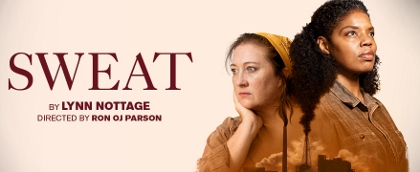
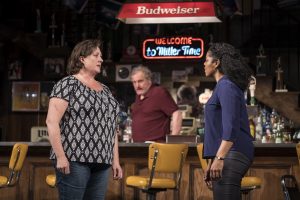
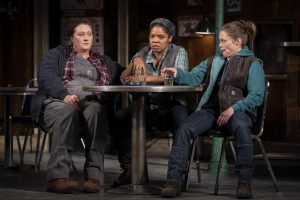

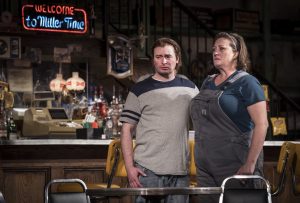
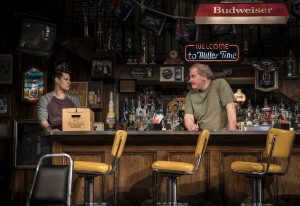

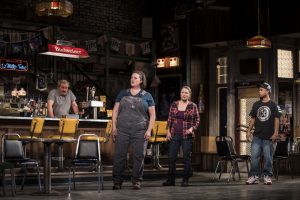
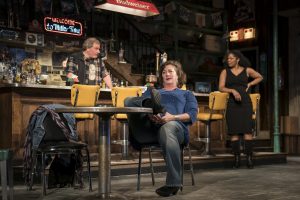


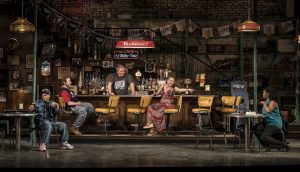


{ 1 comment… read it below or add one }
This is the third, and best written, review I have read of the strongest drama in Chicago this year. I am still aching from this punch in the gut.